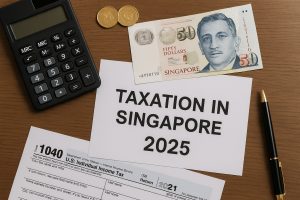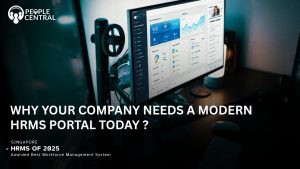Introduction
I recently spoke with an old friend. He told me that he shifted to Singapore and has been working there for a while now. He also told me about how simple and stress-free the tax system is there, and from what I have seen, he is right.
It is 2025 now, and Singapore still has such low tax rates, and not only that, online tax filing is super easy too. Plus, you also get plenty of tax breaks that are sure to help you and your business.
So if you are somebody who is thinking of settling in, or if you are a freelancer or maybe somebody who is running their own business, I’ll say it is really worth understanding how the tax system works here so that you don’t face any problems later on.
It can really help you stay out of trouble and even save some money. So let me walk you through the basics. It is actually more straightforward than it sounds.

Individual Income Tax in 2025
If you are working or living in Singapore, your income tax depends on whether you are considered a tax resident here or not.
Let me explain it to you. Basically, if you have stayed in or even worked here in Singapore for 183 days or more, then you will be considered a tax resident.
But if you have stayed for fewer days than that, then you will be treated as a non-resident.
Okay, so now, if you are a resident, the tax system works on a progressive scale. It starts at 0% and goes up to 24% for income over S$320,000 a year. But here is the good part-you can also get some relief and deductions. You can pay less tax if you put money into your CPF, have a spouse or children who depend on you, or if you have done any national service.
If you are a non-resident, your job income is usually taxed at a flat 15%. But if the normal resident rates would make you pay more, then those higher rates will be used instead. Other income, like director’s fees or rental income, can be taxed at rates between 22% and 24%.
Also, if you are a resident taxpayer, you will get a 60% income tax rebate, up to a maximum of S$200. A little bonus from IRAS.
Also Read: Top Benefits of Using AI for Human Resources in 2025
Corporate Tax Essentials
Alright, so here is something that really surprised me when I first looked into Singapore‘s business taxes. The official corporate tax rate is 17%, which sounds standard, but most small or new companies actually end up paying less because of the exemptions they offer.
So if you are just starting out, there is a start-up tax exemption scheme for the first three years. In this, you get a 75% exemption on your first S$100,000 of profits, and then 50% off the next S$100,000. That alone will bring your tax bill down a lot.
And after those first three years? There is still help. You get a partial exemption, which means up to S$102,500 of your profits won’t be taxed each year. So you still save money, even after the start-up period.
Now, here’s what’s new for 2025. Companies get a 50% corporate tax rebate, up to S$40,000. Plus, if your company hired at least one local employee last year, you will get an extra S$2000 cash grant. Isn’t it a nice way to support businesses that are growing their teams?
GST (Goods and Services Tax) Overview
So, starting from 1 January 2024, Singapore’s GST is now 9%. It is added to most things you buy or services you use, even on imported goods.
But not everything is taxed.
- Exports and international services are taxed at 0% and this is called zero-rated.
- Something like financial services, renting out homes, and digital payment tokens (like crypto) are exempt, which means no GST is charged on them.
Now, if you run a business and your yearly sales go over S$1 million, you have to register for GST. You will need to:
- Charge 9% GST on the goods and services you provide.
- File GST returns every three months using IRAS online.
- Always show prices that already include GST.
Why Does Tax Residency Matter?
If you are a person or a business, your residency status in Singapore really affects how you are taxed.
For individuals, being a resident means lower tax rates and access to tax reliefs. If you are a non-resident, you usually have to pay higher taxes, and you don’t get those extra benefits.
For companies, what matters is where the big decisions are made. If the company holds its board meetings and runs its main operations from Singapore, it is seen as a Singapore tax resident.
Common Tax Mistakes to Avoid
There are a few common mistakes that can easily get you in trouble with taxes in Singapore:
- Filing your income tax or GST returns late: If you are filing your income tax return or GST return late, then you have to pay penalties or extra interest, which you will not like.
- Getting CPF contributions wrong: This often happens when employees don’t use proper payroll software
- Not registering for GST: So, if your business is making more money than the limit set for GST, you must register for it. Some people often forget or don’t even know this, and it can cause problems later.
- Using tax reliefs the wrong way: Now, using tax relief the wrong way can be a problem. Like, suppose if you claim the same relief twice or do not meet the rules for the relief, this can lead to mistakes or penalties.
So let me give you a tip: always check emails from IRAS. If they need you to file something, they will usually tell you. Also, keep your records organised. It will help you avoid audits and extra stress later.
Simplify Tax and Payroll with PeopleCentral
If you are running a business, then staying on top of tax compliance can be tough, especially when you’re already going through a hundred other things. That is where PeopleCentral really helps.
It is one of the top payroll and HR platforms in Singapore, and it takes a lot of that tax stress off your plate. Let’s see what it does:
- Automatically calculates CPF contributions and tax deductions
- Sends reminders when it’s time to file
- Connects directly with IRAS for Auto-Inclusion Scheme (AIS) reporting
Also Read: 6 Trends in AI and HR to Watch in 2025
Here’s a real story: a local F&B business started using PeopleCentral to handle their payroll and CPF. The platform handled filings and sent alerts on time, so they avoided any late fees, and they also cut down their admin time by over 40%.
PeopleCentral is known for being super easy to use and great for staying compliant. If your business is dealing with Singapore’s changing tax rules, this tool can really make things smoother.
Conclusion
So yes, Singapore‘s tax system is really smooth and friendly. You just need to stay organised, follow the rules, and use a tool like PeopleCentral. That’s it, then you don’t have to worry about much.
The thing is, if you’re working here or running your own thing, knowing the basics goes a long way. It saves you from stress later, and you might even end up saving some money too.








 5
5


























